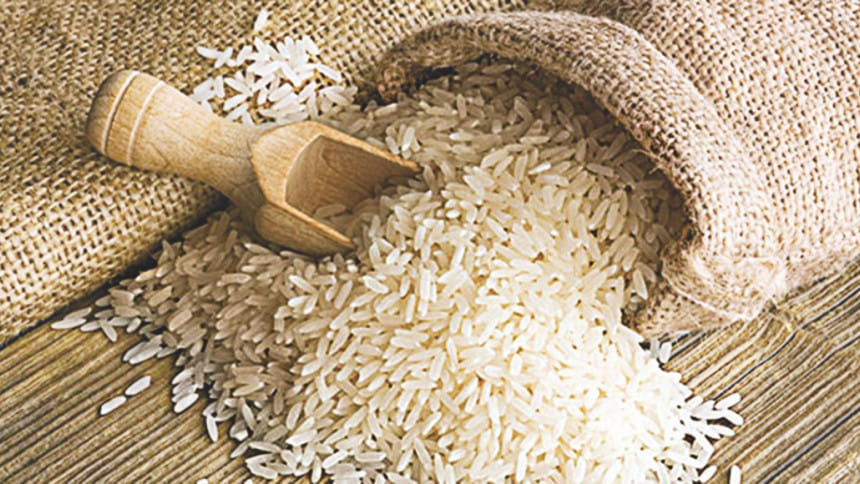Supply adequate, yet rice prices up

Rice prices have gone up as millers and traders hiked prices banking on the government decision to raise import duty on the cereal to 28 percent from 2 percent, say market insiders.
Over the last ten days, prices of all types of rice shot up by Tk 3 a kilogram at retail markets in the capital.
Coarse rice, mostly consumed by low-income people, was sold for up to Tk 45 a kg yesterday, up from Tk 42 a week ago, according to the Trading Corporation of Bangladesh (TCB) data.
The increase in rice prices comes at a time when farmers had a good harvest in Aus, Aman and Boro seasons in the last fiscal year. Besides, 41.12 lakh tonnes of rice were imported during the period, the highest in the last 30 years.
On June 7, the government raised duty on rice import to 28 percent from 2 percent so that farmers get better prices of paddy.
Bangladesh Bureau of Statistics (BBS) is yet to estimate the total production of rice in the just concluded Boro season. But overall production is expected to exceed the government target of 1.90 crore tonnes.
Production in the previous Aus and Aman seasons also saw a rise, indicating that the overall production of the crops, including Boro, would be higher than 3.56 crore tonnes in the last fiscal year.
The country had a supply of around 3.57 crore tonnes of rice in fiscal 2017-18 against the annual consumption requirement of 3.10 crore tonnes, according to estimates by the BBS and the food ministry.
At the same time, stocks of foodgrain at public warehouses rose more than three times to 13.21 lakh tonnes on June 27, show food ministry data.
Asked, Md Arifur Rahman Apu, director general of the Directorate General of Food, said there is no logical ground behind the price hike.
“Market has ample supply because of good Boro harvest and high imports.”
The DG said his office plans to begin open market sales of rice and flour in labour-intensive areas so that the poor can get the cereals at subsidised rates.
Rice will be sold for Tk 30 a kg and flour for Tk 18 a kg, he added.
Abdur Rashid Dewan, owner of Matin Rice Agency in Old Dhaka's Babubazar area, said prices of imported rice went up following the duty hike.
Millers demand higher prices of rice on various excuses, including increase in duty on rice import, he added.
Md Mayen Uddin Manik, a rice trader in the capital's Karwan Bazar market, also blamed importers and millers for the recent price hike.
The domestic market registers an increase in rice prices at a time when prices of the grain are falling on the international market.
For example, prices of Indian parboiled rice (5 percent broken) fell 2.5 percent to $355 a tonne in the third week of last month. Prices of the same category rice in Thailand and Pakistan also declined, according to the food ministry's Fortnightly Food Grain Outlook.
Asked about the reason behind the price spike despite bumper production and huge import, KM Layek Ali, general secretary of Bangladesh Auto Major and Husking Mills Association, said, “This is also my question ... where has all the rice gone?”
He said many seasonal traders got involved in rice trade after the government slashed import duty on rice to encourage import and curb price hike of the staple last year.
“The government should monitor the market to see whether millers or others are increasing prices ... It is easy to shift the blame onto us since we process rice.
“Only a few millers may have stocks of rice ... Most of them started buying rice from local market after the duty increase,” he added.
Following the duty hike, rice import through Benapole, the country's biggest land port, dropped to 5,500 tonnes from 55,000 tonnes a month, reports our Benapole correspondent.
Prices of paddy went up by Tk 80-100 a maund as a result of the duty hike, said Nirod Boron Saha, president of an association of rice wholesalers and commission agents in Naogaon, one of the major Boro producing areas.
Citta Majumder, managing director of Majumder Group of Industries, said millers and traders have begun purchasing paddy from farmers in larger quantity after rice import got costlier due to the duty hike.
“We both import and process rice. After the duty hike, we have also started buying paddy,” he said.
Citta said Swarna variety of rice, grown in the Aman season, was imported mostly from India, and its price rose for duty hike and also for depleting stocks.
Besides, the traders who have stocks are releasing those slowly, he mentioned.
“But it is unlikely that rice prices will rise further as both private and public sectors have quite good stocks,” he added.
Abul Bashar Chowdhury, chairman of Chittagong-based BSM Group, one of the leading importers of essential commodities, said a section of retailers are trying to increase prices capitalising on the duty hike. But they are unlikely to succeed.
“Unlike the previous year, rice prices will not go up sharply this time,” he added.
Our Benapole correspondent contributed to this report

 For all latest news, follow The Daily Star's Google News channel.
For all latest news, follow The Daily Star's Google News channel. 







Comments